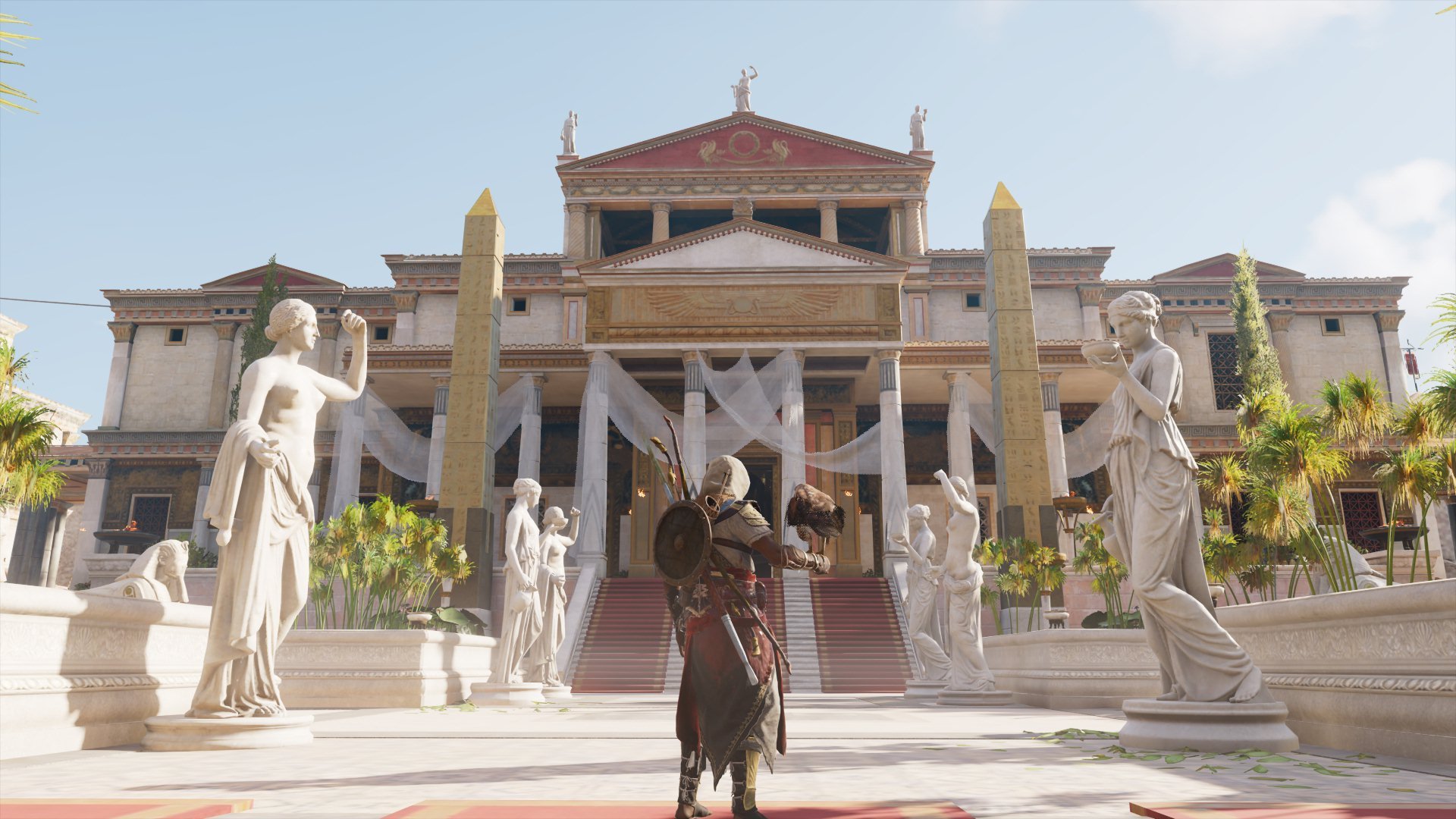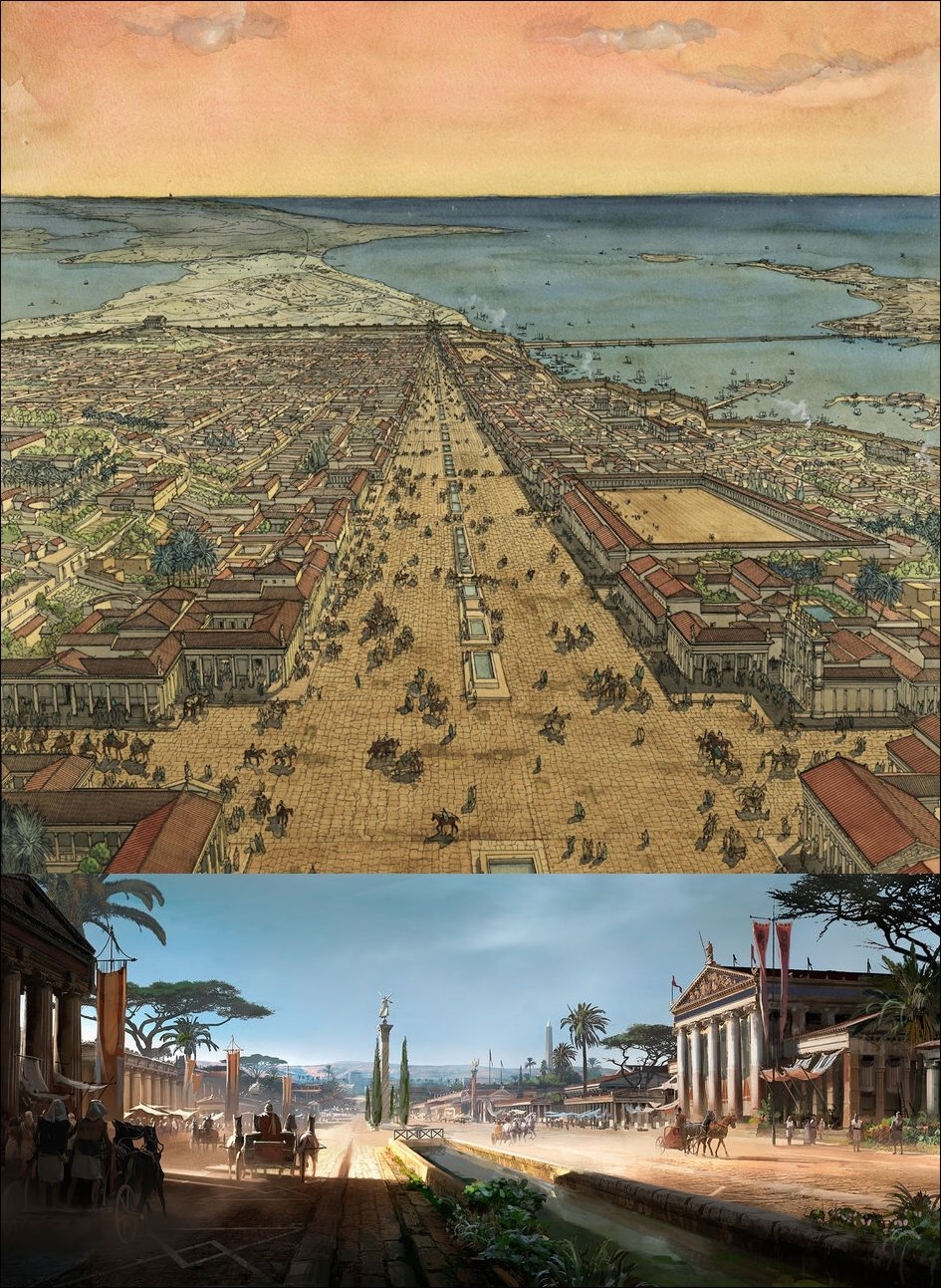The Ptolemaic Kingdom was an Ancient Greek state based in Egypt during the Hellenistic Period. It was founded in 305 BC by Ptolemy I Soter, a companion of Alexander the Great, and lasted until the death of Cleopatra VII in 30 BC. Ruling for nearly three centuries, the Ptolemies were the longest and most recent Egyptian dynasty of ancient origin.
Alexander the Great conquered Persian-controlled Egypt in 332 BC during his campaigns against the Achaemenid Empire. After Alexander's death in 323 BC, his empire quickly unraveled amid competing claims by the diadochi, his closest friends and companions. Ptolemy, a Macedonian who was one of Alexander's most trusted generals and confidants, won control of Egypt from his rivals and declared himself pharaoh. Alexandria, a Greek polis founded by Alexander, became the capital city and a major center of Greek culture, learning, and trade for the next several centuries. Following the Syrian Wars with the Seleucid Empire, a rival Hellenistic state, the Ptolemaic Kingdom expanded its territory to include eastern Libya, the Sinai, and northern Nubia.
Plan of Alexnadria. Alexander's chief architect for the project was Dinocrates, who used the Hippodamian grid plan.
To legitimize their rule and gain recognition from native Egyptians, the Ptolemies adopted the title of the pharaoh and had themselves portrayed on public monuments in Egyptian style and dress; otherwise, the monarchy rigorously maintained its Hellenistic character and traditions. The kingdom had a complex government bureaucracy that exploited the country's vast economic resources to the benefit of a Greek ruling class, which dominated military, political, and economic affairs, and which rarely integrated into Egyptian society and culture. Native Egyptians maintained power over local and religious institutions, and only gradually accrued power in the bureaucracy, provided they Hellenized. Beginning with Ptolemy II Philadelphus, the Ptolemies began to adopt Egyptian customs, such as marrying their siblings per the Osiris myth, and participating in Egyptian religious life. New temples were built, older ones restored, and royal patronage lavished on the priesthood.
Ptolemaic Royal Palace, Assassin's Creed Origins
The early Ptolemies were careful to maintain the distinction of its population's three largest ethnicities: Greek, Jewish, and Egyptian. At first, Egyptians were probably the plurality of residents, while the Jewish community remained small. Slavery, a normal institution in Greece, was likely present but details about its extent and about the identity of slaves are unknown. Alexandrian Greeks placed an emphasis on Hellenistic culture, in part to exclude and subjugate non-Greeks.
Two main streets, lined with colonnades and said to have been each about 60 meters (200 ft) wide, intersected in the centre of Alexandria
The law in Alexandria was based on Greek—especially Attic—law. There were two institutions in Alexandria devoted to the preservation and study of Greek culture, which helped to exclude non-Greeks. In literature, non-Greek texts entered the library only once they had been translated into Greek. Notably, there were few references to Egypt or native Egyptians in Alexandrian poetry; one of the few references to native Egyptians presents them as "muggers." There were ostentatious religious processions in the streets that displayed the wealth and power of the Ptolemies, but also celebrated and affirmed Greekness. These processions were used to shout Greek superiority over any non-Greeks that were watching, thereby widening the divide between cultures.
Library of Alexandria, Assassin's Creed Origins
From this division arose much of the later turbulence, which began to manifest itself under the rule of Ptolemy Philopater (221–204 BC). The reign of Ptolemy VIII Physcon from 144–116 BC was marked by purges and civil warfare (including the expulsion of intellectuals such as Apollodorus of Athens), as well as intrigues associated with the king's wives and sons.
Alexandria was also home to the largest Jewish community in the ancient world. The Septuagint, a Greek translation of the Hebrew Bible (the Torah and other writings), was produced there. Jews occupied two of the city's five quarters and worshipped at synagogues.
The Great Synagogue of Alexandria, Assassin's Creed Origins
Religion
When Ptolemy I Soter made himself king of Egypt, he created a new god, Serapis, to garner support from both Greeks and Egyptians. Serapis was the patron god of Ptolemaic Egypt, combining the Egyptian gods Apis and Osiris with the Greek deities Zeus, Hades, Asklepios, Dionysos, and Helios; he had powers over fertility, the sun, funerary rites, and medicine. His growth and popularity reflected a deliberate policy by the Ptolemaic state, and was characteristic of the dynasty's use of Egyptian religion to legitimize their rule and strengthen their control.
The Serapeion of Alexandria, Assassin's Creed Origins
The cult of Serapis included the worship of the new Ptolemaic line of pharaohs; the newly established Hellenistic capital of Alexandria supplanted Memphis as the preeminent religious city. Ptolemy I also promoted the cult of the deified Alexander, who became the state god of the Ptolemaic kingdom. Many rulers also promoted individual cults of personality, including celebrations at Egyptian temples.
Worshipers of God Serapis, Assassin's Creed Origins
Ptolemaic Egypt was highly stratified in terms of both class and language. More than any previous foreign rulers, the Ptolemies retained or co-opted many aspects of the Egyptian social order, using Egyptian religion, traditions, and political structures to increase their own power and wealth.
As before, peasant farmers remained the vast majority of the population, while agricultural land and produce were owned directly by the state, temple, or noble family that owned the land. Macedonians and other Greeks now formed the new upper classes, replacing the old native aristocracy. A complex state bureaucracy was established to manage and extract Egypt's vast wealth for the benefit of the Ptolemies and the landed gentry.
Statue of Alexander the Great, Assassin's Creed Origins
Greeks held virtually all the political and economic power, while native Egyptians generally occupied only the lower posts; over time, Egyptians who spoke Greek were able to advance further and many individuals identified as "Greek" were of Egyptian descent. Eventually, a bilingual and bicultural social class emerged in Ptolemaic Egypt. Priests and other religious officials remained overwhelmingly Egyptian, and continued to enjoy royal patronage and social prestige, as the Ptolemies' relied on the Egyptian faith to legitimize their rule and placate the populace.
Map of the Ptolemaic Empire in red at its height, via New York University Institute for the Study of the Ancient World
Although Egypt was a prosperous kingdom, with the Ptolemies lavishing patronage through religious monuments and public works, the native population enjoyed few benefits; wealth and power remained overwhelmingly in the hands of Greeks. Subsequently, uprising and social unrest were frequent, especially by the early third century BC. Egyptian nationalism reached a peak in the reign of Ptolemy IV Philopator (221–205 BC), when a succession of native self-proclaimed "pharaoh" gained control over one district. This was only curtailed nineteen years later when Ptolemy V Epiphanes (205–181 BC) succeeded in subduing them, though underlying grievances were never extinguished, and riots erupted again later in the dynasty.


















